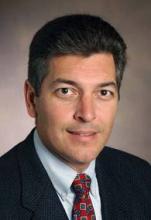Responses to the posting filtered in on the bulletin board, ranging from supportive notes of encouragement to harsh responses from colleagues who questioned whether a person with an eating disorder can competently serve patients or keep up with the pace of training or medical practice.
Wrote one: Despite how good a narrative it may seem to you to be bouncing back and striving forward, medicine is an extremely high pressure lifestyle that can wreak havoc on anyone, and stress/sleep/competition are primary triggers for a range of mental illnesses. It does no one any good, not society, not to yourself, to have some med student break down, or a resident wash out, or yet another doctor commit suicide.
The fear of discovery or being rejected by and drummed out of the profession, casts a dark shadow over professionals struggling with eating disorders, emphasized Dr. Berkus.
"In a person with an eating disorder, the message that ‘you don’t belong,’ can be a universal message that they’ve carried for a long time," she said.
On the website, some medical students questioned the judgment of program coordinators who insisted the poster get help before continuing her studies.
Said one: Exactly what danger is this person in risk of? Passing out while rounding? Erosive esophagitis? Neither of these truly present a risk to the patient. "Danger to others" implies explicit threats, or impaired behavior, e.g., substance abuse. Certainly she is placing her own body at risk, but what about those who overeat and place themselves at risk for other complications?
Some professionals ultimately decide to step away to seek treatment, which can be lengthy and expensive. On a website in the United Kingdom, a student posted: I was supposed to start my residency (how do you call it? Internships?) next month, but i decided to stop my study for a while. I just physically/mentally cannot handle it right now. It is so sad ... Another disadvantage i developed because of my ED: I faint! Another taboo in the medical field! I used to love watching surgery, now I’m not so sure. I’m much too scared to pass out.
By the time medical students and physicians seek help, they often require inpatient hospitalization because of the extent of the medical and psychiatric complications of their disease, said Dr. Bermudez.
"I don’t think many physicians, young or old, graduated or not, are willing to recognize how serious the issue is.
"Denial is part and parcel of the eating disorder mentality but, in doctors, it runs a little deeper. Medical training reinforces that mind-set of, ‘I can handle it’ or ‘I have it under control to the ‘nth degree.’
"Generally speaking, we don’t make the best patients."
On the other hand, medical professionals, like other eating disorders patients, "absolutely can recover," when they fully commit to treatment, returning to successfully complete their training or reclaim a vibrant office or clinic practice.
"Eating disorders are treatable illnesses, much like depression," stressed Dr. Bermudez. "The propensity remains with an individual – [he or she maintains] the vulnerability factors, but those can go back to being under check."
Anecdotally, he’s seen it happen, as have the other experts interviewed for this story. But data chronicling the prevalence of eating disorders in the medical profession, their severity or their prognosis, are scarce.
Remarkably, the most recent study documenting the prevalence of eating disorders among U.S. medical students was published in December 1985 (J. Nerv. Ment. Dis. 1985;173:734-7). The article reported a 15% lifetime prevalence of an eating disorder among 121 female medical students aged 19-36 years. Specifically, 10 had a past history of bulimia, 5 had a current history of bulimia, and 4 had a history of anorexia nervosa.
However, the study preceded publication of the DSM-IV by many years, and subsequent studies have determined that anorexia nervosa, in particular, is diagnosed significantly more often under DSM-IV criteria.
Current dissertation research by a doctoral psychology student at Midwestern University in Downers Grove, Ill., has more recently found a prevalence of significant eating disorders and behaviors of nearly 13% among 700 male and female graduate health care professionals, including medical students.
That rate, according to Midwestern behavioral medicine professor Ann Sauer, Ph.D., "was very similar to that found in the general population ... [with] no significant difference in the rate of eating disorders attitudes and behaviors among the different disciplines."
"Working in a medical school/graduate school setting, I have also found that there is a real lack of information available on this topic," said Dr. Sauer in an interview.


